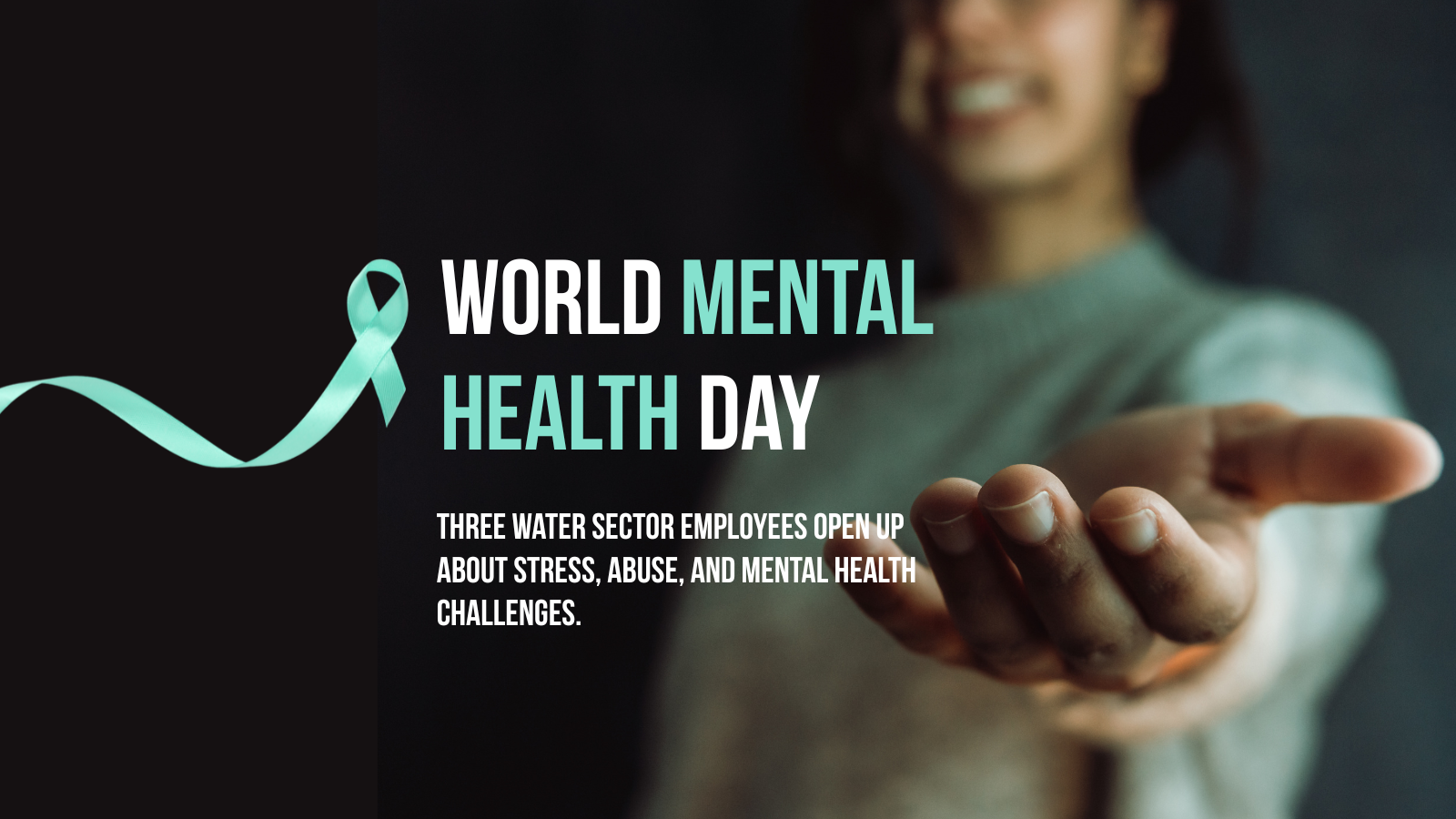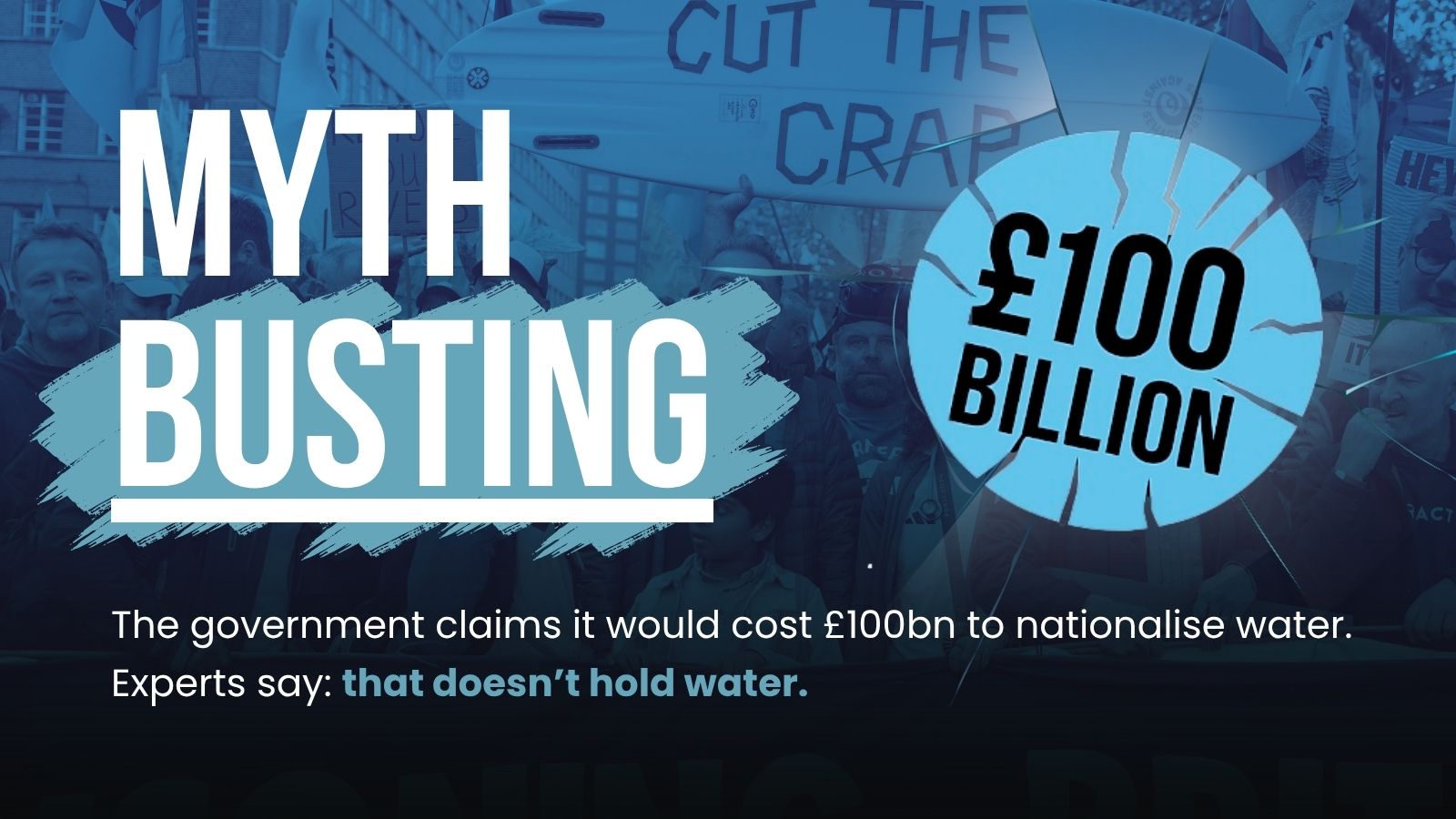
World Mental Health Day – The people behind our water
By James Wallace, CEO of River Action & Alex Papuca, Senior Communications Coordinator
Water should unite us all, not divide us
“Be kind, for everyone you meet is fighting a hard battle” – Plato
When rivers run foul or bills rise, frustration flows quickly. That anger is understandable, but too often it is directed at the wrong people through verbal and sometimes physical abuse. The engineers fixing broken pipes, the call handlers answering complaints, and the operations teams responding to pollution are not the ones making the big decisions in water companies. They are the ones trying to hold the system together.
Rather than venting our frustration at the staff trying to fix the problems, we should be focusing our concerns – peacefully – on the water company leaders, investors, regulators and the Government that are culpable. They are the ones responsible for bill increases, polluted waterways, private profiteering and failed regulation.
This World Mental Health Day, we are reminded that kindness and respect can make a world of difference. With help from Unison, the leading union in utilities, we spoke to workers within the water industry about the challenges they face, the abuse they endure, and the moments of humanity that keep them going. We found the conversations both enlightening and deeply sobering. To protect their anonymity, we have given each of the workers a pseudonym. Here is what they had to say:
Tony

Tony is an Operations Manager at Severn Trent, overseeing teams who work daily to maintain essential water and wastewater services across the Midlands. With more than two decades in the industry, Tony has seen the sector evolve through major changes in regulation, technology, and public scrutiny. He now represents staff at a time when pressures on the water industry are at an all-time high, and he’s passionate about ensuring that the voices and well-being of frontline workers are not forgotten in the debate.
Q: From your perspective in the industry, how have things changed over the years?
“In the early 2000s, there just wasn’t the same level of regulation. OFWAT wasn’t putting the right governance in place to stop problems before they happened. Back then, we had around 5,000 employees; now there are almost 12,000, and all of our wastewater operations are managed in-house. The sector has grown massively, but so have the pressures and expectations on staff.”
Q: What kind of impact has that had on employees?
“Staff are constantly getting heat from the public. There’s a lot of anger directed towards the industry, and that often falls unfairly on the people on the ground, especially the ones out there repairing infrastructure, responding to incidents, and trying to do the right thing. We’ve had members face some really frightening situations. There was an unprovoked machete attack on workers in Wolverhampton, and another case where a member of staff was stabbed with a screwdriver. Verbal abuse happens far too often.”
Q: How does it feel to be working under that level of scrutiny?
“There’s a lot of pressure right now, especially with increased regulation and public attention. People want to do the right thing, but it’s a stressful environment. We’re seeing a rise in stress-related cases among employees. The whole casework scenario has changed because of it. Many staff feel they have no voice to counter the negative narrative that’s out there.”
Q: How has this affected you personally?
“To be honest, I don’t wear a Severn Trent jacket in public anymore. I just don’t want to draw attention to myself. That says a lot about how people in the industry are feeling at the moment.”
Q: What message would you want the public to hear this World Mental Health Day?
“Please remember that the people out there fixing leaks, managing treatment works, and responding to incidents aren’t the ones making the big decisions. They’re doing their best under a lot of pressure. Kindness and understanding go a long way. The challenges the industry faces are real, but so are the people behind it.”
John

John is a Network Controller at Yorkshire Water, managing incidents and customer complaints from the front line. He’s often one of the first points of contact when something goes wrong, whether it’s a burst main, a pollution event, or a surge in bills. With public frustration growing, John shares what it’s like to work on the streets when tensions are high.
Q: What do you think the public often misunderstands about the people who work on the ground in the water industry?
“The public often misunderstands that those of us working in the field don’t make the big decisions. We’re just a small cog in a very big system. We work for the company, but we don’t own it, and we don’t have a say in how it’s run. There’s only so much we can do from our side, and we’re doing our best to fix problems as quickly as possible.”
Q: How does public anger or frustration around issues like pollution or water company performance affect you and your colleagues personally?
“It does get quite verbal. People are upset and I get that, but sometimes the anger gets directed at the wrong people. We’re the ones trying to sort out the problem, not the ones who caused it. People sometimes shout abuse during callouts, and it’s only a matter of time before someone really gets hurt. It affects people more than you might think. Colleagues take that stress home with them, and it can play on their minds.”
Q: Have you or your team ever experienced abuse or hostility from the public because of the industry’s reputation?
“Yes, and it’s increased a lot over the last year or so. What used to happen maybe once a month is now a day-to-day occurrence. Verbal abuse is the most common; sometimes it’s just frustration, but it can get very personal. We try to stay professional and move on, but it wears people down.”
Q: Are there any small acts of kindness or understanding from the public that really stay with you?
“Absolutely. When people take the time to thank us, offer a cup of tea, or just show appreciation, it means a lot. I’ve had customers bring out cake or send a kind email after we’ve sorted an issue. To be honest, I’m not here for praise; I just want to be able to do my job without suffering abuse.”
Q: If you could say one thing to members of the public who are frustrated about pollution or sewage issues, what would it be?
“I’d like people to know that we, the frontline staff, are working our hardest to fix these issues. None of us wants to see rivers polluted or communities affected. But these problems aren’t caused by the people on the ground; they’re the result of decisions made much higher up. Hold the industry accountable, but please treat those of us doing the work with respect.”
Sarah

Sarah works at United Utilities in West Cheshire, where she supports vulnerable customers and provides mental health support for staff. Her role often involves helping people in distress – whether they’re struggling to pay bills, facing water supply issues, or dealing with difficult personal circumstances. Sarah is driven by a simple motivation: “I do what I do because I want to help.”
Q: What’s your role at United Utilities, and what motivates you to do it?
“I work with vulnerable customers, helping them access support in any way we can, whether that’s through our own services or by connecting them with charities and resources like the Hub of Hope. I’ve also completed mental health first aider training, which helps me support people who are really struggling. I do what I do because I genuinely want to help people. That’s what keeps me going.”
Q: How does public anger or frustration around issues like pollution or water company performance affect you and your colleagues personally?
“There’s a lot of negative feedback at the moment. People are angry, and understandably so, but it’s tough when that anger is directed at staff. We’re trying to do our jobs and help people, but sometimes the abuse gets very personal.”
Q: Have you or your team ever experienced abuse or hostility from the public because of the industry’s reputation?
“Unfortunately, yes, and it’s getting worse. We’ve had staff receive death threats, and one colleague was told someone would kill her dog. Others have had people say horrific things like “I’m going to kill your parents.” It’s shocking, and it’s nothing like what we used to see in the past. The level of hostility has really escalated in the last few years.”
Q: If you could say one thing to someone frustrated about pollution or sewage issues, what would it be?
“We completely understand why people are upset. We see the same headlines and care about the environment too. But we’re just trying to do our jobs to the best of our ability. There’s nothing we can personally do about the big decisions, and we don’t deserve the abuse that sometimes comes our way. If you need to vent, that’s fine, just please remember there’s a person on the other end of the phone who’s trying to help you.”
Q: Are there any small acts of kindness or understanding from the public that really stay with you?
“Yes, there are always people who take the time to write in and say thank you. It doesn’t happen every day, but when it does, it makes a huge difference. It reminds you that most people out there do appreciate what we do and that the kindness far outweighs the hate.”
Please remember
Rivers are under threat, but so are the people working to protect them. On this World Mental Health Day, please remember:
- Frontline water workers are doing their best in difficult circumstances.
- Accountability lies with water company bosses, investors, and regulators.
- Peaceful action is powerful. Target the system, not the staff.
Join River Action and campaigners across the nation by asking your local MP, your council, and your mayor to pressure the Government to:
- Reform the regulators so they can hold profiteering and polluting water companies to account and invest in cleaning up our waterways.
- End privatisation by restructuring and refinancing water companies for public benefit and environmental performance.
Please visit River Action’s River Rescue Kit for advice on how to be an effective campaigner. Together, we can make corporate and government leaders clean-up our rivers while respecting the mental well-being of frontline workers.







